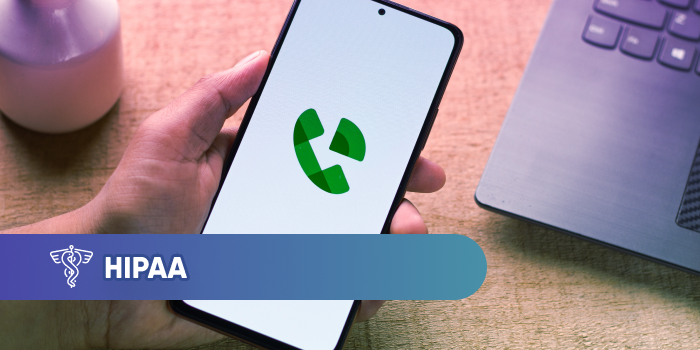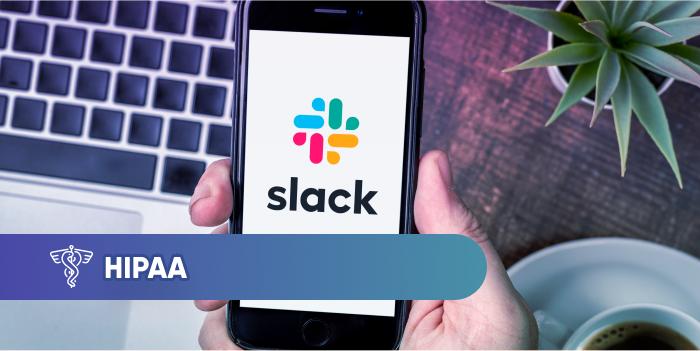Is WhatsApp HIPAA Compliant?
WhatsApp Messenger, or WhatsApp for short, is a communication platform owned by Facebook that allows you to send text and voice messages and make...

Google Voice is a cloud-based phone service. It allows you to choose a phone number that will be tied to your Google account. You can use it across many different devices to make and receive phone calls. This Google app also lets you exchange SMS messages and get voicemail.
Google Voice is a popular cloud-based or Voice over Internet Protocol (VoIP) phone service that allows you to choose a phone number to link to your Google account and use it across multiple devices to make and receive phone calls.
A Google Voice number works on smartphones and the web, giving the convenience of placing and receiving a call wherever you are. This application also lets you exchange SMS messages and get voicemails, too. Google Voice features come with other convenient benefits, such as integrating with other Google apps to offer better functionality to users.
But for healthcare providers, Google Voice must be HIPAA compliant if they plan to use it for telemedicine.
Healthcare systems would benefit from using Google Voice because of the features and convenience that it can potentially provide to both providers and patients. However, implementing Google Voice for healthcare purposes requires HIPAA compliance, and the open-to-all version of Google Voice does not comply with HIPAA regulations.
The Health Insurance Portability and Accountability Act (HIPAA) of 1996 is a federal law that outlines mechanisms for covered entities in the United States to guarantee the safety of sensitive medical information, such as protected health information (PHI). The HIPAA rules also specify guidelines on how covered entities should safeguard PHI when used electronically (ePHI).
As a covered entity, the law requires healthcare providers to sign an agreement with the provider of the communication software application (business associate) they plan to use for healthcare delivery, clinical, and front desk functions that involve PHI. The business associate agreement (BAA) you have with Google Voice, for example, allows you to configure the application to ensure that it adheres to the HIPAA rules.
Google will not sign a BAA for its free consumer services, such as the Google Voice app. Consequently, standard Google Voice is not HIPAA compliant, and you can’t use it to communicate PHI with patients.
However, when purchased with G Suite, you may configure Google Voice to comply with HIPAA.
Google added Google Voice as an option within their paid tool package G Suite in 2018. Since then, G Suite users can purchase it to complement other features in the office suite.
Google will enter into a BAA for G Suite, and you can include Google Voice in the agreement. That made Google Voice eligible for HIPAA compliance through a BAA, which is easy to achieve through a series of steps in your admin account for G Suite.
That’s it. You entered into a BAA with Google for your G Suite package, and the next step is to configure Google Voice to adhere to HIPAA guidelines that you can do yourself using the Google HIPAA Implementation Guide.
You also have to obtain Google Voice licenses for the employees who handle PHI through the Google Voice app. You can do this from your admin console.
When you add Google Voice to your G Suite package, depending on the pricing plan, you get from 10 to an unlimited number of users. That means that you can assign local phone numbers to as many employees as you’d like. Each user gets a unique number, but you can also connect them through call forwarding and multi-level auto-attendant features.
Thanks to Google Voice’s integration with Google Calendar, your employees can sync it with their working hours. At the end of their workday, Google Voice automatically switches to out-of-work mode, and they won’t receive any patient calls. Patients can still call after hours, but an answering machine greets them, and they have the option of leaving a voicemail.
That means you don’t need a dedicated business phone to communicate with patients. Your employees can connect their devices to their Voice-assigned numbers and use these during work hours. That way, you can have separate numbers for the front desk, billing, different specialists, different offices and locations, etc.
If you enable a multi-level auto-attendant, your patients get a phone menu when they dial your clinic. The attendant routes their calls to the person or office they are interested in reaching.
Google Voice has some advantages over an on-premises phone system, such as:
These and other benefits make Google Voice a better option than other costly phone systems. If you think the value for your money is worth it with all the benefits that Google Voice and G Suite can provide you, they’re what you need.
On the other hand, if you’ve realized that you don’t need a better phone call solution because you need a streamlined messaging system, like many other healthcare providers, Google Voice is not what you need.
Americans send and receive five times more text messages than they make and receive calls. Patients prefer reaching healthcare providers via texting, too, but few physician practices offer this sought-after communication method. Yet, a HIPAA-compliant messaging solution that can increase communication efficiency and patient satisfaction — it should be your choice to stay ahead in the competitive healthcare business.
Google Voice does offer the possibility to send SMS messages, but if you’re going to communicate PHI through your texts, you need a secure patient communication application. Google Voice’s primary function is calling, so its SMS feature is nothing special than basic Short Message Service (SMS) messaging.
It’s better to get a healthcare-specific platform that can take your text messages to the next level and help you automate many tedious tasks, while easily integrating with electronic health records (EHRs).
There’s Curogram, a feature-rich communication platform designed for use in healthcare. The platform incorporates a 2-way messaging system and a virtual clinic solution for providing remote medical services or telemedicine.
Curogram guarantees 100% HIPAA compliance by default, unlike Google Voice and other popular and free communication platforms that you have to upgrade and/or configure to make them secure for PHI transfer. Curogram has all the HIPAA-prescribed mechanisms in place to let you do your job without worrying about violating the law.
Curogram also easily integrates with any known EHR in the United States, allowing you to manage schedules and send automated appointment reminders. Curogram can help you reduce your phone call volume by 50%, increasing your staff productivity and your patient traffic as there’s no limit to how many of them can text you simultaneously.
Google Voice is undoubtedly a helpful phone service app. With a few steps and configurations to the app as part of the G Suite, you have Google Voice HIPAA compliant and ready for healthcare purposes. But with the availability of better telemedicine platforms, such as Curogram, medical practices benefit from HIPAA-secure messaging and convenience rolled into one comprehensive and ready-to-use application.

WhatsApp Messenger, or WhatsApp for short, is a communication platform owned by Facebook that allows you to send text and voice messages and make...

Facebook Messenger, also known as Messenger, is one of the most popular instant messaging apps owned by Facebook that has evolved a lot over the...

The demand for remote healthcare services has increased telehealth and telemedicine uptake among medical practices, prompting them to seek out...